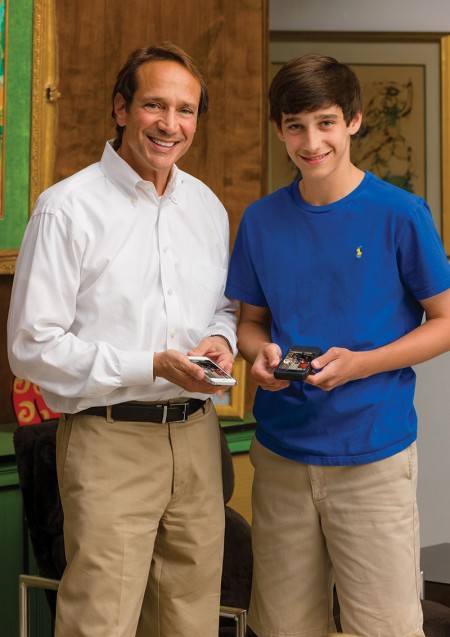Technology gap


Randy Holste got a big surprise when his phone meowed at a meeting, thanks to son Gregory tinkering with the phone's sound effects. (Photo: www.hartphoto.com)
Fred Holste, an engineer, calls his son Randy, also an engineer, to tell him that his year-old, 60-inch television isn’t working. “I need a bigger TV,” Fred says. “I can’t hear this one.”
“Dad, you’re an engineer. You get that it doesn’t work that way,” Randy says, trying to negate the correlation – bigger doesn’t mean louder. After rounds of Randy sending over high-end speakers (unused) and Miracle Ears (unopened), he finally acquiesces and sends a 70-inch television to Fred’s house. After the installation, Randy calls his dad. “How does the TV look?” he asks. “It sounds great!” Fred says.
Such is the gap between technology as we know it and the generations who grew up without it.
The under-30s look like technological wizards to those of us with a few more years under our belts. They’ve grown up with computers and smart phones (my younger daughter doesn’t even remember what a flip-phone looked like). Now, it’s those whippersnappers teaching their parents and grandparents how to be more comfortable and less fearful when navigating a high-tech life.
But not without the occasional chuckle.
Randy Holste, who saved his dad’s hearing problem with a bigger TV, was on-site at an important engineering job, meeting with colleagues. An issue arose, and Randy whipped out his iPhone to snap a photo. He didn’t realize his son Gregory had been playing with his phone, and when he touched the camera button, instead of clicking, his phone meowed. “I started as Mr. Manly Engineer, and then my phone meowed,” Randy laments.
My own mom laughs (thankfully) when she turns on her phone or computer to find that, unbeknownst to her, her screen-saving photos of smiling grandchildren have been switched for photos of grandchildren making crazy faces or, worse, sporting features distorted by apps that stretch eyes or add unicorn horns. Since she has no idea how to replace the pictures, she’s resigned to staring at wacky faces until the kids get their hands on her devices again.
The grandchildren of one nonagenarian (that’s a decade older than an octogenarian) giggle when they remember the morning they picked their YiaYia up for church and she said, “I stayed up too late. I found this new thing. Have you heard of YouTube?”
The grandmother says she watched her grandchildren whizzing around computers and decided to learn. Having attempted an iPad (she couldn’t get Andrea Bocelli’s music to stop playing), she says she’s sticking with an old-fashioned, big-screened Dell to research favorite opera singers and the Bible.
“I was determined to use that iPad, but then I punched a button too hard and all the icons began to fly. I wound up getting so mad I cursed it,” she says. “But not in front of the kids!”
One of the more creative attempts we heard was of a 10-year-old girl teaching her grandfather to double-click. Both frustrated, the girl finally said, “Papa. Pizza pizza,” like the Little Caesar’s Pizza jingle. He got it.
Some grandparents are ahead of the curve. David Gerber learned to use the Internet and create videos to keep up with commercial real estate. “I used to come back from a day of showing properties to 50 phone messages. Now I can’t remember how we functioned before iPhones.”
With eight grandchildren, David is now the family historian, having turned boxes of film from the 1940s into iMovies, and posting family footage onto private YouTube sites.
“I never took classes,” he says. “Just got manuals and read them. Every once in a while the grandchildren call and ask for help.”
A recent Pew survey found that just over half of Americans over 65 are online, compared to 90 percent of 18 to 29 year olds. Barriers like hearing and vision loss and devices made for nimble fingers keep some older people from venturing into high-tech. Top that with a maze of devices and thousands of choices in software and apps, and you’ve got one daunting proposal.
In an interview on NPR’s Science Friday, Tom Kamber, executive director of Older Adults Technology Services (OATS), said, “People who don’t adopt…are blocked in a lot of their basic life processes.” But help is waiting for those who want it. Apple stores offer free classes, as do Houston Public Libraries. Or browse magazine stands for titles like iPad & iPad mini for Seniors, which offers “jargon-free” tips.
Or, just make a date with a willing 12 year old.
Want more buzz like this? Sign up for our Morning Buzz emails.
To leave a comment, please log in or create an account with The Buzz Magazines, Disqus, Facebook, or Twitter. Or you may post as a guest.


